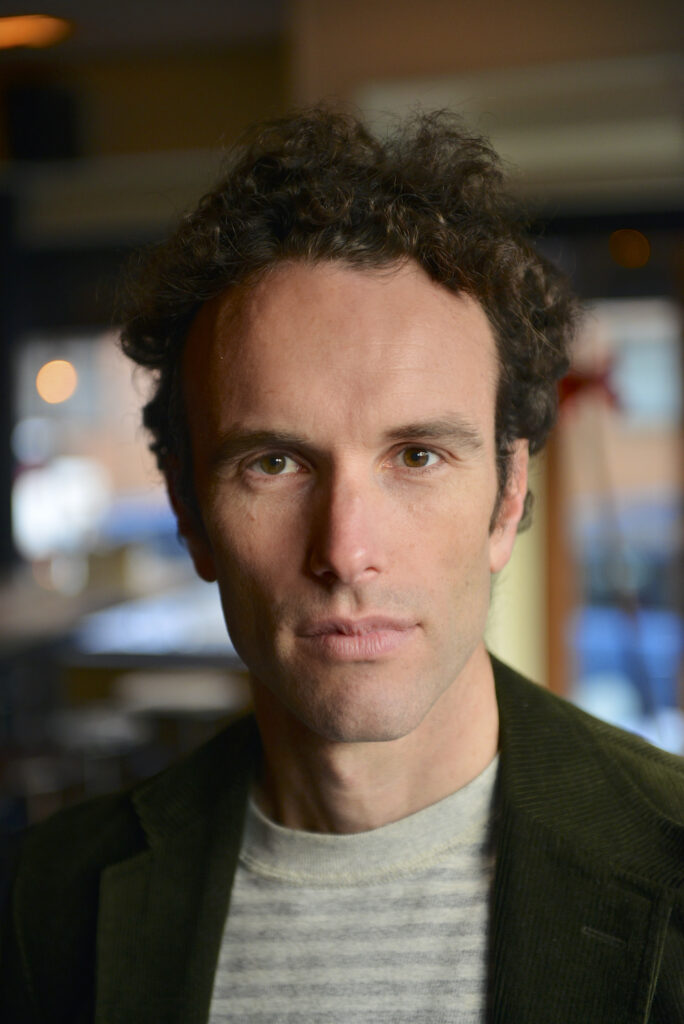Kathleen Alcott is the author of the critically acclaimed novels America Was Hard to Find, Infinite Home and The Dangers of Proximal Alphabets.
Praise for AMERICA WAS HARD TO FIND
“Sprawling but absorbing…. Ambitious…. Shimmering, knife-sharp descriptions of small and often devastating moments of individual experience within those larger histories…. The reader experiences the era’s social upheavals and contests of values at their most intimate register.” (New York Times Book Review)“Ms. Alcott is an impressionistic stylist capable of lovely, luminous effects on the brushstroke level of the sentence…. Such writing seems well suited to fantasy, and because nothing is more like a fairy tale than space travel, it makes sense that Ms. Alcott is at her best in zero gravity.” (Wall Street Journal)“A marvel of compression and controlled description…. Fay’s ambition, at the start of America Was Hard to Find, is to make life ‘happen more deeply inside her.’ Alcott’s novel is a finely calibrated machine that does the same for us.” (BookForum)“[Alcott’s] prose has a way of finding the cinematic in the personal …. What hooks the reader are Alcott’s darts of wisdom and finely tuned observations…. Alcott’s narration is penetrating and elegant, but she gives her characters some of the wittiest and most screen-ready dialogue in contemporary fiction.”(Paris Review)“Kathleen Alcott writes with pulsating, intense prose, delivering an account of how lives can be meshed and torn apart…. Powerful…. America Was Hard to Find leaves readers wanting more of this story and everything else Alcott has written.” (BookPage)“Like Franzen or DeLillo, Alcott brings awe-inspiring exactitude and lyricism to her dive into three of America’s most iconic moments…. In her exquisite and poignant reimagining of historic events, Alcott dissects their impacts in a sweeping yet intimate saga that challenges assumptions and assesses the depths of human frustration.” (Booklist (starred review))“This richly ruminative novel refracts 30 years of American culture and history through the lives of [its] characters…. A sharp and moving reminder of the human dimension of even the most outsize historical events.” (Publishers Weekly)“[Alcott’s] empathy for troubled souls, rendered in haunting, impressionistic prose, makes a powerful emotional impact, giving the novel a staying power…. Impressively ambitious and extremely well-written.” (Kirkus Reviews)“This novel is charged with the electricity of an intellect sharp and awake, and every instant of this story reverberates in us with the insistency of a deep longing. Amidst the noise of the world we live in, Alcott’s voice is the one I want to always hear.”(Valeria Luiselli, author of The Lost Children Archive and Tell Me How it Ends)“America Was Hard to Find beats with the culturally savvy heart of a Rachel Kushner novel, extends the moral reach of a Philip Roth novel…. Alcott is a master of many tricks, and her novel is a marvel of style, information, intelligence, and humanity.” (Heidi Julavits)
Praise for INFINITE HOME”Captivating.” (New Yorker)“A collection of vividly drawn characters seem to breathe right out of the pages.” (Entertainment Weekly)“Don’t expect this novel to deliver trite messages about the redemptive power of makeshift families. Yet these damaged characters, in spite of themselves, provide one another with unexpected offerings of consolation and love.” (New York Times)“Infinite Home is a story about a handful of people’s lives and their excuses not to live them, and how neither our lives nor our excuses can last forever. ….Kathleen Alcott’s beautiful telling of their stories is dense with individual sentences that are beautiful all on their own. She’s that kind of writer. You might cry. You’ll probably cry, actually. (I cried.)” (Gawker)“Alcott’s sophomore effort does wonders in building a fragile web of familiarity, and compels the reader to become an extended part of it.” (NYLON)”Kathleen Alcott’s second novel takes on a big question — what makes a ‘home’ a ‘home’? — and answers with stunning originality…. Beyond this compelling story, Alcott’s incredibly accomplished prose is good reason to put Infinite Home at the very top of your to-read list.” (Bustle)“Novelist Katheen Alcott calls into question what “home” really means – is it a physical space populated by the belongings you acquire, or a state of mind achieved when you’re surrounded with those you feel most at ease with? In Infinite Home, she posits that it’s somehow both.” (The Huffington Post)“Infinite Home doesn’t disappoint. At turns despondent and darkly funny, Alcott has woven a uniquely beautiful story which challenges the way we view the concept of home… [W]hat Alcott does with her small community is nothing short of magic. Through short scenes, written with an exacting care and beauty, she creates characters that are so well realized that by the novel’s end, it’s easy to mistake these lost souls for friends, for people that we meet during our everyday constitutionals in the city.” (Brooklyn Magazine)“I read straight through its 317 pages in about a day. This is … mainly a direct result of Alcott’s page-turning, character-driven prose. [Infinite Home] offers up a story about the quest to find connection, meaning, love and a life that feels all our own.” (Brooklyn Based)”Quietly wonderful… Alcott displays a deft hand with every one of her odd and startlingly real characters…. The voices in this book speak volumes. A luminous second novel from a first-class storyteller.” (Kirkus (STARRED))“Alcott’s writing has an acute sensory quality, and she’s at her imaginative best when describing the small, quotidian moments of her characters’ lives…Alcott’s writing is generous, and her peculiar cast of characters memorable.” (Publishers Weekly)“A stunningly sensitive exploration of how families are made and unmade, and how the search for one’s place in the world can come to define a life. Kathleen Alcott writes characters so achingly real, they will take up permanent residence in your imagination. This novel is the evidence of a wondrous talent at work.” (Laura van den Berg, author of The Isle of Youth and Find Me)”Infinite Home is Kathleen Alcott at her lyrical best. In her arresting new novel, she explores the boundaries of family and fraternity, with a Brooklyn brownstone as the nexus of the occupants’ interlocking worlds.” (Nathan Englander)“Kathleen Alcott is part sculptor and part fire-breather—not only are these characters intricately carved but they stand up, walk right off the page and beckon us into a story that is both vivid and welcoming.” (Ramona Ausubel, author of No One is Here Except All of Us and A Guide to Being Born)“Vibrant, inventive, expansive. Kathleen Alcott has peered through the walls of an everyday apartment building and transformed the private lives of its tenants into pure poetry. Infinite Home is as much a story of those neighbors we may only know in passing, as it is a commentary on the beauty and misfortune of our modern age.” (Said Sayrafiezadeh, author of Brief Encounters with the Enemy)“Starting with the first page of Infinite Home, you will feel it: something different, something brave, and something fundamentally amazing about Kathleen Alcott’s power over the English language. Every yearning character in this breakout novel is flesh and blood. Alcott’s roving heart, and power as a storyteller, may very well be limitless.” (Patrick Somerville, author of This Bright River)
Praise for THE DANGERS OF PROXIMAL ALPHABETS
“A beautiful story of love and heartbreak…[a] joyously good first novel.” —Wall Street Journal”Heartbreaking, honest, and wholly engrossing, The Dangers of Proximal Alphabets dredges the depth of love that divides us, unites us, and folds in on itself until we’re nearly crushed under the sweet ache of its weight.” —Bookslut”The Dangers of Proximal Alphabets is a powerful and emotionally resonant novel that beautifully and with rare precision explores the magnetic danger of love. Alcott has found a language for the unsayable. At one point Ida worries that she has inherited her father’s capacity of never forgetting. I, for one, am very grateful for her memory.” —Peter Orner, author of Love and Shame and Love“The initial sense of beauty and sweetness between the two [Ida and Jackson, (siblings by marriage)] is tempered by uncomfortable intensity and claustrophobia…and what emerges as a whole is an emotional narrative that is not easy or relatable but that sparks with convincing pain and nostalgia.” —Publishers Weekly“The narrative…expertly interweaves Ida’s current reflections with her introspection about past events, some simple and innocent, others complex and appalling…All add dimension to each character and help establish the emotional depth of a well-told story. An accomplished debut.” —Kirkus”…she is a skilled storyteller, and her understanding of just how dangerous it can be to love someone worms its way through almost every sentence.” —The Boston Globe”This book sachvui.corays the intensity of young love and the trouble its volatility can cause. When Alcott digs deep into Ida’s psychology, describing her obsession with Jackson and her loss of innocence, her prose really hits home.” —Real Simple”The Dangers of Proximal Alphabets is a powerful and fascinating debut novel that explores the complexities of love.” —Largehearted Boy”The Danger of Proximal Alphabets reminds us that untangling the knots of our lives can sometimes be more threatening than cutting them off completely…[Alcott] shows us how deeply pain can be tied to love, and she takes us on a quest that highlights the mythic proportions of both in our lives. Alcott’s ability, in the end, to intelligently parse out the positive aspects of a painful childhood and still celebrate the comfort they give us makes Proximal Alphabets a worthy coming-of-age novel.” —Tottenville Review”An excellent work of cerebral, lifelike fiction; it illustrates how fractured people use each other to mend themselves into full people, and how even bonds that strong can break.” —Timestage Embassy”Alcott’s novel weaves a web of betrayal, intimacy, and pain, questioning the lengths to which we will go in our attempts to save others and ourselves. Abstracted yet utterly believable, the novel comments with grace on the dangers of triangulation and, as Alcott so eloquently puts it, “proximal alphabets.” The debut is a haunting tale of what it should and should not mean to be a family.” —The Brooklyn Rail”A dark story, one that the reader may want to look away from at times, about those we love and those we take advantage of and those we just can’t live without.” —Bohemian”[The Dangers of Proximal Alphabets] is poetically written and easily readable, a credit to a talented writer. The content is certainly visceral, gritty and blunt, but there are also deep insights and many interesting questions raised. This book on the unbreakable nature of destructive forms of love will surprise and captivate many readers, particularly those who enjoy dark fiction and gritty modern literature.” —Book Reporter”As a debut novel this shows immense promise, and as a singular story it is one that is likely to linger.” —The Creosote Journal”Alcott’s novel is a lyrical treat. She is a true literary talent and skilled beyond her years. I eagerly look forward to reading more of her work.” —The Masters Review”An exploration of the redemptive and destructive qualities of art, how we communicate without words and the arbitrary definition of “family,” The Dangers of Proximal Alphabets is an overlooked gem.” —The Coast



